Tom Kepler's Blog, page 10
September 2, 2018
A Cat Has Nine Lives--How Many a Writer?
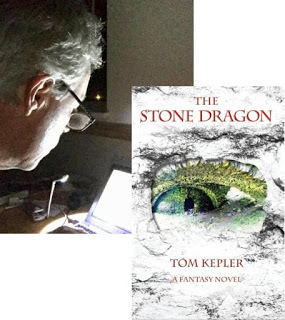
It's good to be writing again, and it's also good to know that I started up again by just "following my bliss," by writing for the joy of it. Like everyone, my life has encompassed several "lives" or phases. Throughout all the phases of my life, though, writing has been a constant. I began this current phase of my life after my first wife's passing, and my publications during this phase reflect the changes that have occurred during this time--my first wife's death, marrying again, my son growing up, job change, moving to a new home, the passing of my parents.
A major writing achievement during the last decade was the creation of a fantasy-genre universe--the Dragons of Blood and Stone universe. The fantasy novel The Stone Dragon was the first product of that vision, the story of Glimmer, a young man who dreams his magic and who must learn to control his dreams.
After publication of the novel, I later began writing short stories set in the same universe. A small ebook, Who Listened to Dragons: Three Stories, was the result of my curiosity of what else was going on in the DBS universe.
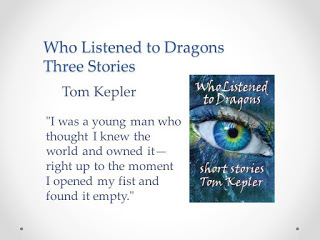
A half dozen other story ideas set in this universe--and two fully developed stories, "A Murmuration of Dragons" and "Perchance Beneath a Quince Tree" led me to the possibility of collecting the stories into a book, Stories from the Stone Dragon Inn. The last few years I haven't written much because of family obligations and also personal changes and trying new things. It occurs to me now that the smaller projects of writing short stories is a good way to move back into fiction and publishing, with five stories already written for the Dragons of Blood and Stone universe and good seed ideas already sprouted. Stories from the Stone Dragon Inn may very well be my next fiction book publication.
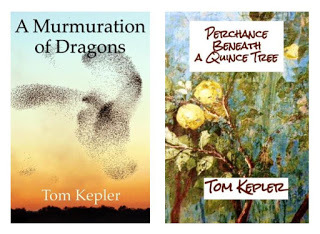
One enjoyable aspect of short story writing, especially flash fiction (stories less than 1,000 words), is that I can try out new styles of writing, new angles, new characterizations, and not be committing to a hundred thousand words. I published an early short story in 2010, titled "Cull," in an online magazine called Metazen, now defunct. (Ironically, the URL link now goes to a car rent agency!) I've also published two flash fiction stories not connected to the DBS universe, over the last ten years. "Spider" was my experimentation with a horror story, published in Every Day Fiction on Halloween Day, 2010. I actually got paid a dollar for that puppy. The second flash fiction story was published in a science fiction zine, 365 tomorrows, on New Year's Day, 2011. It's title is "In the Beginning," and it is a story about the genesis of our species. I seem to be hitting the holidays so far!
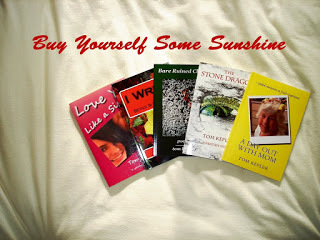
Two non-fiction books I've published were developed because of a friend's comment: "Tom, you should take those blog posts and turn them into a book, since they're all on the same subject." This comment was the seed idea that led in 2012 to I Write: Being and Writing , a series of essays about the writing process and consciousness.
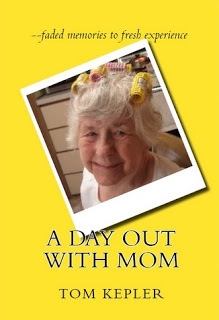
The second non-fiction book is based on my experience providing caregiving for my parents. I left teaching abruptly in the spring of 2013 to travel to California to care for my parents (and for my brother, who was their caregiver but who had shattered his leg). I blogged about sleeping on the sofa for seven months, about reconnecting with my family again--living with them as I hadn't since I was a kid. As I wrote, I found myself writing in my mom's and dad's voices, from their perspectives as they told me the stories from their lives, about growing up and all their years together. These memoirs and essays were compiled, polished, and published (2014) as A Day Out with Mom. I'm proud of that book.
I published two books shortly after I married my second wife. Both of these books, Love Ya Like a Sister and Bare Ruined Choirs , were really about my earlier life or my "first life" (or second or third?)--with my first wife and my son, and with my life as a public school teacher.
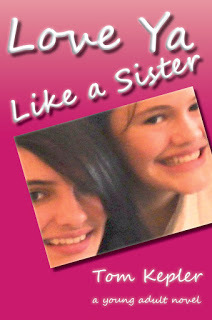
Love Ya Like a Sister is a young adult novel I began writing during the time my first wife was dealing with cancer. It was an escape, really, a chance to write and do something creative during a very tough time, but there were long lags and gaps in the writing process, due to my responsibilities. Completed years later, after my wife had passed and I had remarried, LYLAS is a novel about neglect (even regarding parents who both work and can't help not always being at home). It's a novel about the dangers of inexperienced kids driving cars, of the dangers of sex and alcohol and drugs. It's about how so many kids luck their way through adolescence, intuitively--and it's a novel about my making it through a very tough time.
Bare Ruined Choirs is a story told in poetry of the full life of a relationship--from first-met to the final dying breath. It's a small book, but some of my best writing, and is dedicated to my first wife. I had been writing poetry for my whole life up to the death of my first wife. I realized I could select poems that would chronicle the life of a relationship--lover, spouse, parent, caregiver. This book was a chance to come to terms with the changes in my life, to complete a cycle of my life in a creative and healing manner.
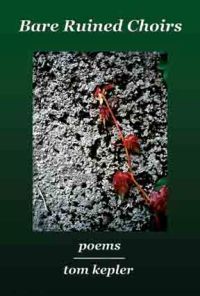
I remember a story about Isaac Asimov, the great writer of the golden age of science fiction, a man who published books that were cataloged under every major category of the Dewey Decimal System for libraries, a man who published over 200 books. Later in his life he read one of the novels he had written early in his career. Reading his own novel many, many years after writing and publishing it, the story goes that Asimov was asked by a friend, "How did you like it? How was it?" Asimov replied something like, "Not bad. Pretty good writing." I'm re-telling a story that is probably apocryphal in the first place, but here's the idea as it relates to me: I've written pieces that I think have their good, strong qualities . . . but would I write the same things now, with the same content and style? I don't think so. However, that doesn't mean I can't appreciate the good qualities of what I've written in the past.
Part of growing older should be learning to give ourselves and others a break, to have some tender mercy. This post is a retrospective of what I've written in the past, but more so it's a look to the future and its endless possibilities, of how I'm looking forward to my next word, my next page, my next poem or story, my next book. You all are invited follow my journey.

Published on September 02, 2018 07:00
August 26, 2018
I Feel This Obligation to Write
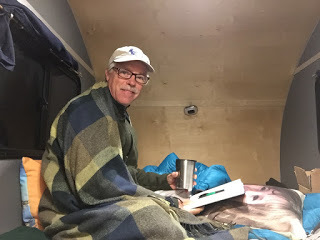 Dawn in my little camp trailer, tea and notebook.I feel this obligation to write--another novel, a book of essays, a field guide--to be like Faulkner, Emerson, Lewis and Clark. I'm ignoring this sense of obligation, though. When I began writing at the age of sixteen in my ruled, spiral notebook, I was writing for the pure joy of it. That's what I need now, to just enjoy the flow of words.
Dawn in my little camp trailer, tea and notebook.I feel this obligation to write--another novel, a book of essays, a field guide--to be like Faulkner, Emerson, Lewis and Clark. I'm ignoring this sense of obligation, though. When I began writing at the age of sixteen in my ruled, spiral notebook, I was writing for the pure joy of it. That's what I need now, to just enjoy the flow of words.This joy of words is central--joy is important. It is essential. Publishing in my notebook, three blogs (apply as needed), and some online interaction with folks who are interested in what has my attention right now is just what I need.
Not just the joy of words, but especially the flow of words. Fluency is not just a matter of expertise but also of engagement--not practice, but rather momentum. Use that writing muscle, flex it, stretch it, and then I start feeling like I'm in shape again. My writing stamina increases . . . and probably enough of this metaphor, even though it seems apt.
I've found my daybook an excellent writing activity for me because I can use it at odd times when away from the computer--early in the morning or during a break when going for a bicycle ride. I don't need to set up the office. Also, I really enjoy pasting in photos that relate to my entries. I write only of the right side of the notebook, when I open up two blank pages facing me. The left side (or backside of the page) I save for taping photos, receipts, or instructions from purchases. It gives the notebook this kind of "untamed" look--nothing is exempt and, consequently, the notebook is already beginning to have this overstuffed look. I'll have to find a large rubber band soon. I order photos online from my phone/camera, and then when they arrive, I slap them in. Of course, there's the incentive of making sure that I have something written about the photos I have ordered.
Out of this fluency will flow larger projects, more formal ones, I hope. For the moment, I'll just follow the joy, toss words onto the page like a literary Johnny Appleseed. It's spring, and I'm mud-luscious.

Published on August 26, 2018 02:34
August 19, 2018
Writing in a Daybook
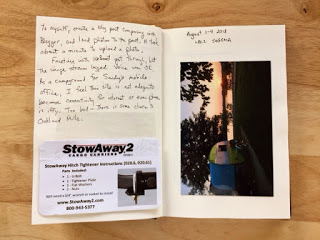 I've bought this book of blank pages as a writing aid to help me get back into the habit of writing regularly . . . about something, anything, just putting words on the page, much like Natalie Goldberg advocates in Writing Down the Bones: Freeing the Writer Within. So far I've written narratives of my days, added photographs, inked in sketches and construction diagrams, included owner stickers, made lists, recorded information I might need at a later time--I'm just using the book as I proceed through the day, adding whatever is useful to me right then or what might be useful in the future.
I've bought this book of blank pages as a writing aid to help me get back into the habit of writing regularly . . . about something, anything, just putting words on the page, much like Natalie Goldberg advocates in Writing Down the Bones: Freeing the Writer Within. So far I've written narratives of my days, added photographs, inked in sketches and construction diagrams, included owner stickers, made lists, recorded information I might need at a later time--I'm just using the book as I proceed through the day, adding whatever is useful to me right then or what might be useful in the future.The focus of the entries centers around my wife and my new aquisition--a teardrop trailer, the Green Goddess. I've written during our three excursions about the events of the day. I've sketched out plans for adding more shelving and storage space, plans of where to add an additional electrical socket. Pasting in information about my new trailer hitch seemed a good idea. And, of course, a few photos of the cute little trailer.
According to the online dictionaries, the technical definition of daybook is from business--a record of transactions as their occur, later to be transferred to the ledger. A more general definition is a book where one records the activities of the day, a diary or journal, but perhaps allowing for more informality. I think this definition of a daybook fits my use perfectly.
I am also reminded of the daybooks of naturalists and other folk working out in the field, books that include sketches of plants and animals, descriptions of events and the behavior of animals, narratives of interactions with weather. I would like this book to be a mnemonic device, something to look back on later to enliven my wife's and my memories of this time as we begin this adventure with our little camper. The photos, sketches, product stubs, and narratives, the lists and building plans should provide a rich source for remembering.
If all goes well, I expect this daybook to deliver three advantages for my writing: 1) a bound and permanent location to record camping experiences with our camper, 2) a place to collect plans, ideas, and materials as we develop our trailer camping techniques, and 3) a source of ideas and details that can be used as I write posts for my Green Goddess Glamping blog.
Sometimes it's good to get away from the keyboard. When I wrote poetry, I drafted in a bound book, moving to typewriter (and later computer) only once revising the poem was almost finished. I certainly can't explore an idea with word, sketch, and flow charts as easily on computer--at least not on one page. Wait a minute--I'm sure that can be done; I just don't know how to do it. There is a tactile, physical experience of writing on the page, though, especially with a pencil, the way the graphite feels as it pulls across the page with the faint resistance. It's an experience so old it feels new again. I want to buy some water colors and colored pencils. Then I can sketch and paint flowers and trees. I sketched with a black pen the image of an Americian lotus in blossom. That was fun, but it would have been more fun to add the greens of the stem and leaves, and the ivory and white of the blossom with its yellow center.
Useful, fun, inspiring--productive.

Published on August 19, 2018 07:00
August 12, 2018
The Blogs They Are a-Changin'
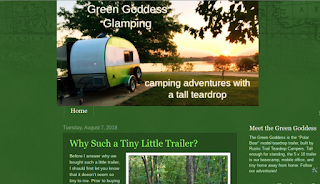
Come gather 'round readers
Wherever you roam
And admit that the blogs
Around you have flown
To places that leave you
Confused and alone
If your time to you is worth savin'
Then you better start readin' by laptop or phone,
For the blogs they are a-changin'
Imagine harmonica riffs in the background as I tell you I'm transferring one of my two blogs to another platform and adding a third blog. This transfer and adoption will better meet my needs and locate my posts in a more reader-invested environment.
First of all, this blog, Tom Kepler Writing, will remain the same. I use it for writing about the process of writing, for writing about my writing, and for premiering my writing. My attention has been more on my family lately and these posts have been few, but this is a good blog for me, since I've been writing--for my own joy--for the last fifty years. However, sometimes I find posts slip in that are outside the original scope of this blog. That's why I started a second blog about bicycling, another great joy in my life.
My second blog, Tom Kepler Bicycling, is going to be dropped, at least how it is now structured. I still ride and enjoy writing about bicycling, but I feel the blog never had the audience I wanted. The solution? Crazy Guy on a Bike. This is a website, crazyguyonabike.com, that I already use because the website is used by thousands of other bicyclers interested in bicycle touring, so when I post a journal of a ride I've finished, or of a product I've reviewed, or an essay on bicycle riding, I have an instant audience. Therefore,I won't be dropping my bicycle writing, just moving to a more lively platform. (In fact, what I've been doing is double-posting my bike writing to both my blog and CGOAB. I'm just simplifying.) When I post a journal or article to CGOAB, I'll then post that information on Facebook and probably also develop a list of emails of readers who would like to be informed by email.
I now have a new blog, Green Goddess Glamping (greengoddessglamping.com), which focuses on my adventures with my new teardrop travel trailer. I'm excited about this new blog because I write about what's important in my life--yes, even with fantasy writing, which is still about people and how we perceive reality and live in it. Green Goddess Glamping isn't just about a little RV travel trailer. It's really about sharing this new adventure with my wife. I love bicycle touring, but I do it alone. In fact, that's one of its attractions. However, I've missed having adventures with my wife. With little-trailer camping, we'll be having adventures together. We'll bring along our folding bikes and pedal together. Also, my wife will have a chance to get out of the office more because we are learning how to make the teardrop her mobile office for her consulting work.
Of course, this specialization could get silly-ugly. I could have a cooking blog, I could have a gardening blog, I could have a movie review blog, I could have . . . well, you get the idea. However, Facebook must have some utility, so gardening or cooking posts to FB can provide me with some interaction with Friends (with a capital "F"). I can also differentiate between posting on my Facebook page, Tom Kepler Writing, or on my personal page, although to be honest, there does seem to be a good dollop of crossover.
Let me repeat myself:
Tom Kepler Writing
Green Goddess Glamping
Tom Kepler Bicycling Profile at Crazy Guy
Tom Kepler Writing Facebook Page
So gather 'round readers
Wherever you roam
And visit my blogs
In their new, tiny homes
For the blogs they are a-changin'

Published on August 12, 2018 06:40
August 8, 2018
Netflix's The Ranch: Exploding the Strong, Silent Male Stereotype
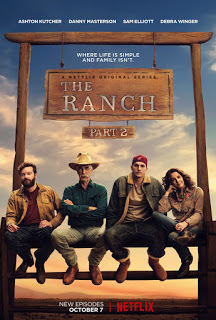 It took my wife and I a while to finally try Netflix's series "The Ranch." We liked and were curious about the cast, a talented ensemble, many of whom we'd seen before on "That 70's Show," not to mention Sam Elliott and Debra Winger. However, the concept of curmudgeonly father and dysfunctional family was not a new premise, and we weren't sure we wanted to once again sit through ludicrous fails at familial harmony. Was that ever really funny? We finally decided to sit down and see if "The Ranch" could pull it off.
It took my wife and I a while to finally try Netflix's series "The Ranch." We liked and were curious about the cast, a talented ensemble, many of whom we'd seen before on "That 70's Show," not to mention Sam Elliott and Debra Winger. However, the concept of curmudgeonly father and dysfunctional family was not a new premise, and we weren't sure we wanted to once again sit through ludicrous fails at familial harmony. Was that ever really funny? We finally decided to sit down and see if "The Ranch" could pull it off.It was a while into the series before we noticed that Sam Elliott produced the series, and it was Elliott's character Beau Bennett that first attracted our focus. Beau Bennett is the modern-day version of those characters Elliott played in westerns--right and wrong are clear-cut (and punishment trumps forgiveness), there's no need to discuss something because you either know it or you don't (and if you don't know "it," you're not worth knowing or respecting), and ultimately no one lives up to the standard (which is why they spend most of their lives alone). This last personality trait is what must have inspired the show's theme song to be Willie Nelson's classic "Mothers, Don't Let Your Babies Grow Up to Be Cowboys," who are always alone, even when they're with the one they love.
My wife and I watched the first couple of shows, each episode being a half hour long, in the great tradition of TV sit-coms. We almost stopped at that point because of the excessive bickering within the family. With us, anyway, a little of that goes a long way. Then Ashton Kutchter's character Colt came to the foreground, Kutcher displaying a remarkable ability to move from very real emotion to two-dimensional comic characterizations and slapstick. This is especially true with the interaction between the Bennett brothers, Colt and Rooster (Danny Masterson). What further kept our interest was the inclusion in the series so many members of the cast of the "That 70's Show"; it was interesting watching those actors interact with one another within their new roles on "The Ranch."
The script writing was sharp and lively, especially the ability of the writers to introduce and integrate material for a joke early in a show but not hit the punch line until much later. Script development continually evolved to include more drama, increasing the intensity of interactions between the sons and Beau, and Beau and his wife and later . . . let's call them girlfriends for lack of a better word. For us, Kutcher pulled the show for quite a while, the other characters being foils to Colt's foibles and foolishnesses. Although the cast really has ensemble status with all characters pulling a great share of the emotional load of the series, Kutcher's acting heightened the comedy of Colt's return to his hometown of Garrison, Colorado. His character was the locus, and Kutcher pulled off the highs and lows like a trapeze artist.
The character of Beau Bennett is also a focus for the storyline. He owns the ranch, action focuses on his relationship with his wife and other women, and his sense of right and wrong is the reference point for the actions of the characters. Because of the courage of the series' treatment of the conflicts of the storyline, a great deal of action transforms from comedy to drama, transitions admirably accomplished by the cast. Much of the drama and comedy of the series is derived from the stereotype of the strong, silent male--so aptly portrayed through the years by Sam Elliott's acting. In "The Ranch" we see this stereotype in all its aspects, warts and all. We see its strength in holding up under adversity, and we see its weaknesses in terms of the ability to interact with others as fully realized adults. The male characters here don't get to shoot someone and then ride off into the sunset. They have to talk and share to succeed; they have to forgive rather than judge for the relationships to continue. This dynamic fuels much of the show: both the comedy and the drama. Danny Masterson with great acting precision displays the stereotype at its most two-dimensional worst, walking that knife's edge between hilarity and tragedy within the dysfunctional parameters of his characterization, maintaining just enough good-guy saves to keep his character fresh and believable. The character of Colt is the rebel for the cause of the strong, silent stereotype. He's willing to cry, to wear Uggs, to use hair products. He's willing, again and again, to denounce the myth, and therefore to be the true-to-life version of that stereotype (albeit a comedic version), expanding its boundaries to show that strong and silent doesn't mean rigid and mute.
Even Beau Bennett's character changes, slowly and painfully, and that pain is experienced by Beau (the strong, silent hero tearing up and admitting that he has done wrong) and by his family when his unbending, rigid response to human emotions and frailties causes divorce and ruptures in his closest relationships. The series portrays real human drama in its latter episodes, the drama becoming so intense that the canned laughter at the jokes jarred with obvious artificiality. This was great stuff, superior work by the entire series' production personnel. The last two or three episodes of the fifth part reveal how serious the production was of exploding the myth of the strong, silent male. I'm going to add a spoiler here for analytical support, so those who don't want to know, stop reading.
When Beau denounces Colt as a thief and initiates action that will result in Colt's conviction, I told my wife, "The writers had Beau cross a line here. He's no longer a good guy with flaws. He's a bad guy." Later, Beau is persuaded by his girlfriend Joanna to fix the situation for his son, and Beau bravely and honorably, with understanding and remorse, does so. However, for my wife and me, we were not convinced. Beau states that he will change, that he understands the need to do so. We are not convinced, though. The pain and suffering Beau's rigid self-definition has caused his family is immense. If every dog gets one bite, then Beau's had his. There really isn't any hope, though, that he won't be jarred from sleep sometime and wake up snapping. The success and sweetness of his relationships are due more to others than Beau. He is incapable of catching up and provides too little to late. He even says so when he states that at seventy-two years of age, he doesn't think he can change. The myth of the strong, silent male only works if you (and those within your circle) can stand the pain and isolation
Part 5 ends with hugs between Colt and his dad, but as viewers, we want to tell Colt: "All those denouncements you shouted at your dad, how he always hits the negative--Colt, those were accurate." OK, Colt and Beau hug, but it's as if one of Beau's hands holds a knife, forgotten by both in the fullness of the moment. At some point in the future, Beau will shove that knife into his son's body, either that or the writers will cop out and Beau will mysteriously morph into a different person.
Do my wife and I want to hang around to see the blood and hear the screams? Only if we acknowledge that the show itself has morphed from comedy to horror. "Colt, don't go into the basement with your dad! Don't go down those stairs with him right behind you! Don't, you fool! Don't!"

Published on August 08, 2018 07:00
August 1, 2018
Traveloging Is a Natural
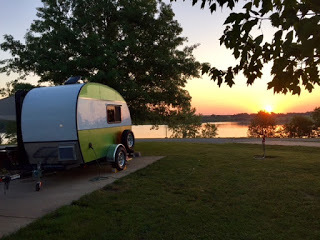 Lake Sugema, SE Iowa, Rustic Trails Teardrop CamperTwo weeks ago I listened to an owl declaring itself in the rainy darkness, its quavering call drifting into my awareness, waking me as I slept for the first time in my new teardrop trailer. What better subject to write about but the rain striking the roof of the trailer with sharp raps, then fading to a soft whisper? Now I sit at a different campsite, a lake brilliant with morning sunshine, the sky a cloudless blue and--a Midwest item of significance--the humidity low.
Lake Sugema, SE Iowa, Rustic Trails Teardrop CamperTwo weeks ago I listened to an owl declaring itself in the rainy darkness, its quavering call drifting into my awareness, waking me as I slept for the first time in my new teardrop trailer. What better subject to write about but the rain striking the roof of the trailer with sharp raps, then fading to a soft whisper? Now I sit at a different campsite, a lake brilliant with morning sunshine, the sky a cloudless blue and--a Midwest item of significance--the humidity low.I have written before about traveloging and tried my hand at it when I've toured by bicycle or ridden the rails with Amtrak. I've researched the topic, re-read my Thoreau, and dabbled in Teddy Roosevelt's meanderings. It seems that writing about traveling encompasses three areas: describing the place, describing the journey, and describing the process. The gravy on the biscuits, though, is the personal experience: destination, route, journey, and traveler.
Recently I've been reading some vlogs, and especially for those who have published their YouTube vlogs for quite a while, the destination, route, journey, and traveler categories fit quite well. I ran across the Long, Long Honeymoon, a travel trailer vlog produced by a married couple, Sean and Kristy. They have an Airstream travel trailer, and I watched their videos on the art of towing and backing a trailer. Informative! They have produced many videos with how-to tips (and how not to), places to stop if you're in the area (bars, restaurants, national parks), equipment reviews (appliances, generators, gps), and personal posts (Q & A, chats, and posts on health and various dramas and adventures). They have managed to combine the objective, individual opinion, and personal experience into an enjoyable cocktail for viewer consumption. On a personal note, their videos on backing a trailer accelerated my learning curve quite a bit. My thanks to them!
My wife is working in her mobile office, and I sit outside, enjoying the cooling breeze, the blues of the lake and sky, and the process of writing. This trip is our first real camping experience with our new trailer, although we did park it for a week at the campground just outside our town, field testing the trailer and some of the equipment we've bought. That was two weeks ago when the owls certified our rig. Now we're thirty miles from home. We've packed our food and sleeping gear, our clothes and campchairs, axe and portable toilet (no connection between the two). The trailer pulled well for the thirty miles even though I listened to every little clunk and clank, analyzing and worry-wondering. We're enjoying ourselves and checking out our set-up, making a list of what should be changed. We have verified once again that macaroni salad is a must-have for a happy camp trip, with watermelon coming in a close second.
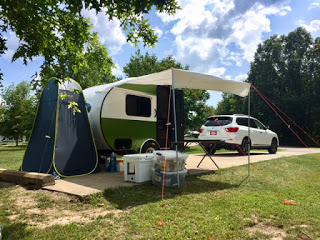
As always, there are two journeys and destinations, the inner and outer. Oddly enough I have moved forward as a human being by learning how to back up. Or is that so odd? I can tell you one thing, I'm in a very beautiful spot right now, and I had to back up to get there. It took me a few tries, but that's OK. I'm right where I want to be. For the moment, anyway.

Published on August 01, 2018 09:21
July 13, 2018
Netflix "Bright" Tarnished After Reflection
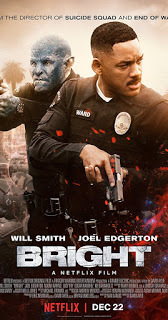 The concept of Netflix's movie Bright really revved my creative juices: a fantasy world like Tolkien's Lord of the Rings but in modern-day times, during the age of men, elves and orcs and men interacting with their guns and cars and cell phones. A great idea! My original review Netflix's Bright, Shiny with Hope, focused on this urban fantasy concept.
The concept of Netflix's movie Bright really revved my creative juices: a fantasy world like Tolkien's Lord of the Rings but in modern-day times, during the age of men, elves and orcs and men interacting with their guns and cars and cell phones. A great idea! My original review Netflix's Bright, Shiny with Hope, focused on this urban fantasy concept.However, after another writer that I know commented on my post, saying that Bright was just too violent for her taste, I realized that I have this Netflix habit that I have to consider when reviewing--the habit of backing out of the streaming, skipping scenes, and then continuing with the movie streaming. I did this quite a lot with Bright because there were too many prolonged instances of violence and torture.
What does it mean when I opt out of the flow of the story. It means that I don't like it, essentially and simply. Much of the movie is just one long series of battles the buddy cops engage in, so much that automatically I would say to myself, "OK, a long gun battle. I get it," and then fast-forward to where the scene changes; or I'd realize the protagonists had been captured by the orcs and torture would ensue to garner essential information. Fast forward.
If Netflix continues to feel that excessive violence is the prescription for success, then I feel that the bright hope of their company's future will be tarnished; no matter how lucrative the endeavor, it's just blood money.

Published on July 13, 2018 04:10
February 2, 2018
A Family Celebration of Mom's Life
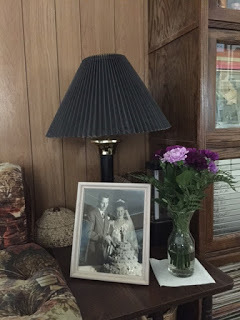 January 23 was when my brother and I celebrated my mom's life. Mom had wanted a small memorial service, so we planned a private ceremony with two cousins at Mom's home. Afterwards, neighbors visited to express their respect for Mom and their condolences at her passing.
January 23 was when my brother and I celebrated my mom's life. Mom had wanted a small memorial service, so we planned a private ceremony with two cousins at Mom's home. Afterwards, neighbors visited to express their respect for Mom and their condolences at her passing. One neighbor said afterwards that she felt there was a warm, close feeling at the celebration. Sharing photos and stories about Mom and Dad, there was a true appreciation of our parents and their contribution to the little mobile home community where they lived for so many years. The time my brother and cousins spent together was also healing and unifying. We shared our memories and re-established our family ties.
I am including in this post a poem I wrote and shared at our family service. I'm also including a video of photographs that provide a picture into the wonderful, loving life Mom lived. God bless her, and thanks to everyone who found a way to support me during this time of transition.
Prayer to Mom
Mother, you gave us everything.
You gave us life and warmth.You taught us kindness.
To you, we give our thanks.We give kindness to others,As you taught us.
Your home was your chapel,And we, your family, your congregation.Through us you gave your devotion.
We hold you in our memoryAs you held us in your arms.
We are your legacy.In your name, we meet today,And by celebrating you, we celebrate the divine.
As Mom is continuing her journey, I know she wants me to continue mine, to find the means to give love and happiness to those around me, to continue to grow in life, and to honor the women in my life all as representations of the Divine Mother. I look forward to my time with my loved ones and know that my mother will always be an inspiration to me.

Published on February 02, 2018 06:10
January 16, 2018
Mom's Treasured Memories
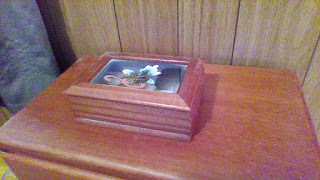 Once Mom said, “Tom, why don’t you sleep on my bed? I can sleep on the sofa.” How sweet and loving was that? Of course, I told her I’d already spent so many months sleeping on the sofa that it was perfectly fine for me but thanks for the offer, Mom.
Once Mom said, “Tom, why don’t you sleep on my bed? I can sleep on the sofa.” How sweet and loving was that? Of course, I told her I’d already spent so many months sleeping on the sofa that it was perfectly fine for me but thanks for the offer, Mom.It has been a week since Mom passed, and have I spent some time cleaning and moving items to give me more space in Mom’s bedroom. I cleaned off the top of one little bureau by her bed--Pond’s skin lotion, eye drops, emery boards for her nails. In the top drawer was her jewelry--a few necklaces and rings, not much or expensive, but right there by her bed. The necklaces were all knotted together, so I spent quite a bit of time untying the knots and setting the pieces in her jewelry box. It's a poignant feeling of oddness, of displacement, to sit on the right side of Mom's bed, the same side I sleep on at home, to sit where she sat, the little blue lamp on her bedstand, which would light at night and I would wake up and see from the living room Mom sitting on her bed, getting her frail five-foot body ready to negotiate by touch her way to the bathroom. Now I sit where she sat; it's my bed now, and I'm making a more comfortable space for myself, just as Mom would want me to do, just as she had already offered. Mom wanted me to be comfortable, what matter her comfort?
As I sit on her bed, the knotted necklaces in my hand, I imagine Mom opening her drawer and touching her mementos but not being able to untangle the necklaces, trying but because of her blindness not being able to. I can feel her frustration and her sense of not being able to keep up, not being able to clean and sort and keep things orderly as she used to. The sense of it breaks my heart, her sitting on her bed, touching the talismans of her life, alone and the years passed by.
I walk to the other end of the mobile home to my brother’s bedroom and tell him what I’ve been doing, how it felt good to untangle Mom’s necklaces for her, but that it was also killing me and I was stopping. I’d done enough organization for one day, provided myself some little space needed to be a little more comfortable. That image is still fresh in my mind, though. That space once occupied so often by my mom's body will no longer be, and it hurts to think about it.
My brother says that there were times he would see Mom sitting by her bed, touching her treasures, remembering the times when Dad gave her each piece. That was how she felt about her jewelry: each was a little stored memory, mnemonic artifacts (although I'm sure Mom didn't use that term). I was so thankful for my brother saying that; it provided me with a different perspective. It turned my head around and made me feel so much better. Mom had a great memory. I could imagine her picking up a necklace, feeling one with a tiny butterfly ornament on a chain, another with a garnet stone, another with a crystal heart--each a memory of her time with Dad. For each piece in her hand, whether a fine little necklace of some plastic costume jewelry in another box, she would touch it, look at it sideways to determine its color (since her macular degeneration affected primarily the center of her eyes), and then with the identification of the piece, a whole memory would unfold--the time of year, the words shared, the time together.
One set of earrings was in a tiny plastic baggie. On the plastic was written “Worn on my anniversary August 1947, Mom.” How long ago had she written that message on that little plastic envelope? It was almost completely faded away. The words were a gift to me, a message reminding me to pay attention to the joys of life, that if you forget the joys of life, then what was there left worth remembering? I believe my mom intensely lived the simple pleasures of her life. Because of her life-long limited eyesight, and because like many women of her generation her life was focused on home, husband, and children, the scope of her outer life was focused on just as few places and a few people. That in no way limited her inner life; the life of her heart, her love, was very rich. She lived a life of love and devotion; she found the psychological means to cultivate her own happiness.
The jewelry was not Mom’s real treasure. Something does not have to be expensive to be precious. Mom’s real treasures were the memories that the jewelry evoked. She had another box of cheap, inexpensive plastic costume jewelry. I’m sure she remembered at what flea market or ham radio fest or car show she and Dad had bought each item--and each memory was a treasure as she sat at her bedside, thinking of her over sixty years of life with my dad--these little celebrations that were not so little; these moments of shared love that transcended time.
I have twenty-seven years to learn this wisdom before I reach my mother’s age: that love is eternal and infinite, that love opens and embraces, that every ending is also a beginning, that to be loved and to love is to give and receive divine grace.
Untangling Mom’s jewelry untangled something in me. Touching her few necklaces and rings, I felt my mother’s love, her devotion; I felt the absolute certainty of her being. She is a drop of water merged with the sea. I stand on the shore, hearing the waves, feeling the mist. Such a very small space separates us from the infinite. Our life's work is to step across that space.

Published on January 16, 2018 13:55
January 6, 2018
Thank you, Mom, and Fare Thee Well
 “She has lived a long life and she’s tired,” the nurse said when I visited Mom. “Her heart has pumped so many times.”
“She has lived a long life and she’s tired,” the nurse said when I visited Mom. “Her heart has pumped so many times.”I had planned to visit my mom in early February and then had upped the date to mid-January, then January 8, and finally January 4. I just felt that it was right for me to be with my mom and brother. Mom had been in the hospital for pneumonia because of her weak heart valves, and then she had been transferred to a facility for strength rehabiliation. It was not to be, though, and Mom quickly moved from chatting to her roommate about her life and family to not wanting to leave her bed for therapy, to not eating or drinking, and on to her last inward journey.
I was with her the day after my arrival, and she was gone twelve hours later. Of the five aspects of existence--earth, water, air, fire, and space--at the end she was fire and space, light radiating, having let go of the body. That is how I remember her, the radiant life of love and devotion. She taught me so much through example.
My wife said she felt that Dad was coming to be with Mom during the transition, and I feel that was true. Mom never had a driving license. Her eyes had been damaged as a child, and her sight was never good enough for her to pass the vision test. Dad took her everywhere, the old trucker with the love of his life. Yes, Dad is hooking up the rig, Mom is stocking the ice chest, and they are taking off to where there are no boundaries, no borders, just open road ahead, on and on and on.
Mom and Dad, Godspeed and fare thee well.
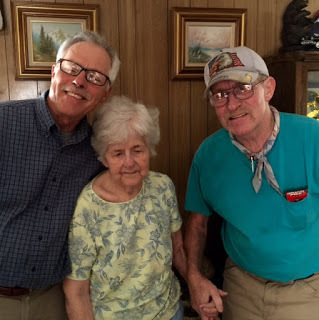

Published on January 06, 2018 17:15



